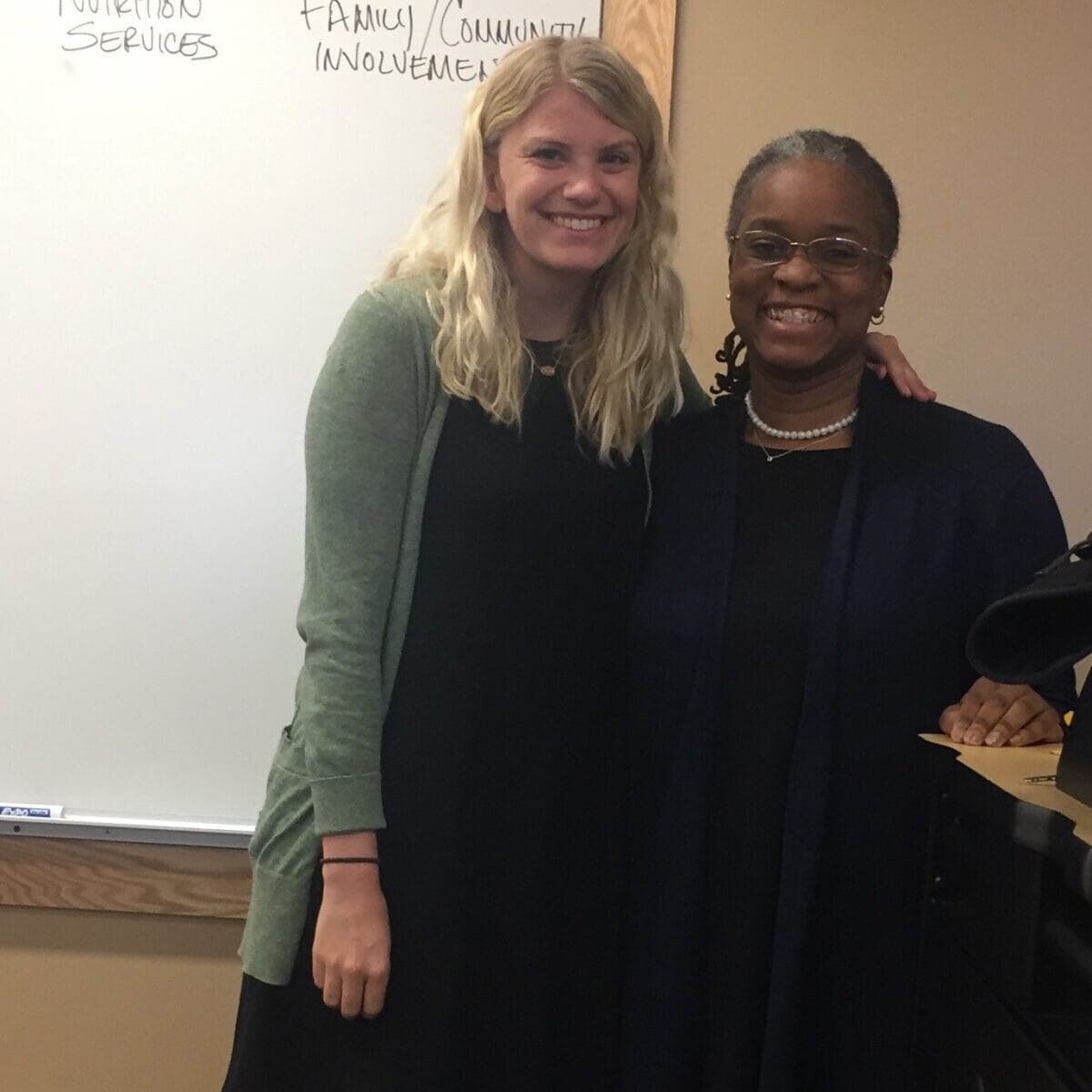Isabella Parise was a relatively shy freshman who entered Governor’s State University as an undergraduate in public health. She sat down in her first college class and was greeted by a professor whose energy was contagious and, to Isabella, a little bit overwhelming. The class was broken into groups and asked a series of questions. After the room quieted to the sound of crickets, and all students tried to divert their attention away from the Professor, Dr. Alicia Battle decided to rattle their cages. “Ya’ll can’t be this quiet or you won’t make it in this class. Come on.” Isabella found the courage to speak up, and over the next four classes, quickly became a voice of leadership for other students, setting the bar higher than Dr. Battle could have hoped. What Isabella didn’t know was that this same class was Dr. Battle’s first class as a Professor, and she too was testing the waters.
Dr. Battle’s philosophy is that, “Students shouldn’t feel uncomfortable about using their voice. If you don’t speak up, who will? Class participation means something. I never lock my classroom door because it’s better to show up late than not at all. It’s not merely about attendance—you have to participate and interact. Your experiences and background are vital to the learning experience of your peers. Where you have been, what you’ve been through, what you have done, that matters. Learning is reciprocal and dynamic.”
Dr. Battle’s approach helped to give Isabella confidence almost immediately, and before she knew it, Isabella was at her office door telling Dr. Battle that she had chosen her as a mentor. They have been working together ever since and have forged both a career and a personal bond that has enhanced both of their lives.
When asked when Dr. Battle knew she wanted to become a mentor, she reflected on her own education experiences. She earned her BA in Philosophy but wasn’t sure what she wanted to do for a career. She signed up for a few random graduate school courses in various topics to help her figure out her career path, one of which was epidemiology. When she sat down in her first epidemiology class, she was pleasantly surprised to see the Black, female, doctor/professor who walked in to teach the class. Before this moment, it had never occurred to Dr. Battle that she could get her PhD. She came from a family of lawyers, and never considered being a doctor. She quit her other graduate level classes and enrolled as the first black student in the Public Health Program. This specific professor was not open to mentoring, and Dr. Battle knew that if she was ever in the same position as her professor, she would welcome a mentee with open arms. “Mentoring is my way of paying it forward,” Dr. Battle says, “I ended up with a few really great mentors who I still keep in touch with today, and I wanted to continue the cycle.”
Dr. Battle also recognizes that your mentors may not be the people you expect and encourages mentors and mentees to look beyond their differences, “My first mentor was a white man, Dr. Daniel Nadler (currently the VP for Student Affairs at Northern Kentucky University). He is still my mentor to this day. Some of my colleagues were surprised to learn that Isabella was not black, and Isabella’s parents were surprised that I was a black woman with dreadlocks. Mentors may not always look like you or be in your exact field or discipline, but if you are willing to learn from them then you can grow into whoever you want to be.”
Isabella values the perceived differences between herself and Dr. Battle, “At the end of the day it’s about making sure communities are healthy, and not about the differences between people. This is the work, you are a community, and understanding each other’s differences makes us stronger and more connected.”
Isabella was fortunate to find this relationship early in her career, “When you put us in a room together, or on the phone, we really just flourish. We bounce ideas off of each other and it’s something that’s invaluable to me.”
When it came time to pick a career path, Dr. Battle helped to get Isabella on track. “She has always been there for me, and she has always been what I needed her to be, not necessarily what I wanted her to be,” Isabella said through laughter.
At the end of her undergraduate career, Isabella went to Dr. Battle to let her know that she was going for her Master’s in Allied Health. Dr. Battle argued that it wasn’t the right choice; she knew that it wasn’t what would actually make Isabella happy. After a long discussion, Dr. Battle signed off on the recommendation while reiterating her concerns. Isabella was accepted to the program, and after a few semesters, found herself going back to Dr. Battle to help her to withdraw from the program, develop a plan for next moves, and figure out what schools would provide the best fit.
Isabella has chosen college health as her field because, “Eighteen-year olds can make their own choices and it’s a unique population. People view college students as being very privileged, but it doesn’t always mean that they are in a state of great health or wellness.”
Isabella has now earned her MPH in Global Community Health Sciences, and after attending the ACHA Annual Meeting as a 2018 ACHF Student Travel Award Recipient, is re-committed to her interest in college health. “Dr. Battle is the whole reason I know about ACHA as an organization,” Isabella says, “She first introduced me to ACHA as a sophomore in college through the NCHA Survey.”
Dr. Alyssa Lederer, Assistant Professor at Tulane University School of Public Health and Tropical Medicine, is the one who sent the application to Isabella encouraging her to apply to have a portion of her travel costs covered to attend the 2018 Annual Meeting. Isabella had a great experience, “The Annual Meeting didn’t feel like a new experience, it felt like a homecoming. I got to spend time with all of the people who helped me along the way. It brought me back to the reasons I entered the field all over again.”
Isabella has some advice for students considering attending the Annual Meeting, “If you are so lucky as to attend the Annual Meeting as a student, you absolutely should. It’s like being a kid in a candy shop with all of the options of presentations and sessions. You also get the opportunity to meet other students that are on similar career paths, and network with your future colleagues.”
About this Award
The ACHF Student Travel Funding Opportunity provides partial funding support for travel and hotel expenses for one or more students to travel to the ACHA Annual Meeting.
Support our efforts to promote student engagement in ACHA and the field of college health and well-being by donating to the Murray DeArmond Student Activity Fund!



